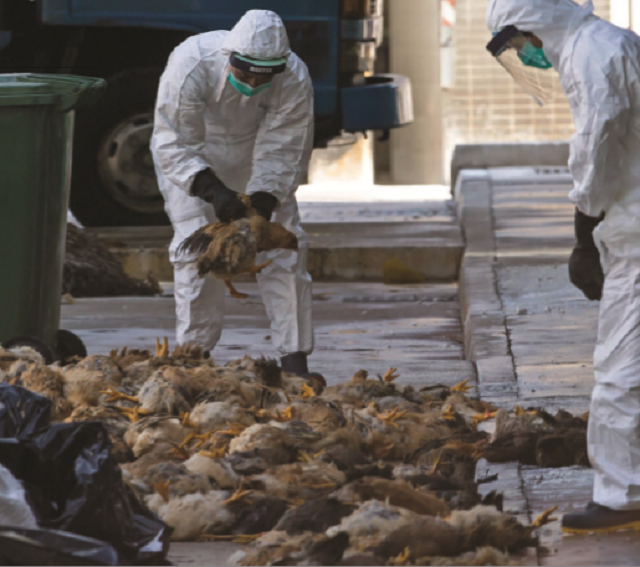
Experts say worst is over – possibly
The good news announcement from the Ministry of Health came on Monday Jan. 30: the strain of avian influenza that was recently responsible for the death of many migrating wild birds in Uganda is possibly not likely to cause so-called `bird flu’ disease among humans.
A written communication to journalists by the Ag. Director General Medical Services, Anthony Mbonye, said laboratory results from the Uganda Virus Research Institute had confirmed that the avian influenza strain seen in the birds is H5N8 and not H5N1. The former is believed to be a less disease causing sub-type for humans.
However, even as the threat of an imminent outbreak of bird flu among humans in Uganda recedes, experts are warning that instead of sitting back in relief, the government needs to do more to avert any potential outbreaks of bird flu. They are recommending an elaborate infection surveillance system, disease diagnosis, and disaster response.
Denis Karuhize Byarugaba, a professor of Veterinary Medicine at Makerere University in Kampala told the Independent that, fortunately, Uganda already has a robust National Influenza Task force to deal with outbreaks. He says the task force has designed response guidelines for both commercial and smaller free range systems. The task force appointed in 2005, following bird flu outbreaks in Sudan, Nigeria, and Cameroon has experts on wildlife, veterinary, human health and disaster management. It already has a disaster preparedness plan.
Gladys Kalema – Zikusooka, a veterinary doctor specialising in wildlife says going forward, emphasis should be on surveillance to avert disease outbreaks because management of a big outbreak can be difficult in countries like Uganda.
She says the proximity between people and birds, especially in rural areas could abet spread of infection. She said other interventions, such as killing of all birds suspected of infection are also difficult to implement.
She said: “It’s hard for non-experts to detect the disease without a lab test because it shows signs similar to other viral infections in birds like Newcastle. You can’t tell people to kill the birds – it definitely can’t work. The developed world has put in place sophisticated surveillance systems and they are highly organized. Birds are kept on farms”.
Zikusooka says increased surveillance would work even for wild birds, especially at migratory bird landing sites.
Wild migrating birds are believed to have caused an outbreak of avian influenza in the wild bird population at Lutembe shores in Wakiso district and in Bukakata sub-county in Masaka.
Dr. Julius Lutwama, the head of Department of Arbovirology, Emerging and Re-emerging Infectious Diseases at the Entebbe based Uganda Virus Research Institute (UVRI), told The Independent on Jan. 18 that no case of avian flu has ever been identified in humans in Uganda. He said, however, that Uganda is among countries in sub-Saharan Africa that face a high risk of an outbreak of bird flu as it’s crisscrossed by several routes for migratory birds, which are carriers of the virus.
Other African countries currently battling an outbreak include Egypt, Tunisia, Ghana, Cameron and Nigeria. In Europe, severe outbreaks in domestic birds have happened. Last year, many countries in Europe and Middle East suffered severe outbreaks forcing authorities to cull millions of birds in an attempt to stop further spread of disease.
Experts say bird flu also known as avian flu can affect human beings, birds and less commonly pigs. Disease symptoms in birds may include sudden death, lack of coordination, diarrhea, and purple discoloration of the wattles, combs, and legs. In humans, the symptoms are similar to those of acute respiratory infection and include runny nose, sore throat, headache, respiratory difficulties, fever, muscle aches and diarrhea.
Tested response
When news of a likely outbreak of bird flu in Uganda first surfaced in early January, there was widespread apprehension but little panic among members of the public. The calm reaction was likely because the Ugandan public and medical community have become accustomed to dealing with outbreaks of difficult diseases including the dreaded Ebola hemorrhagic fever, Marburg, and cholera. Many people now listen to advice from the Ministry of Health and adhere to precautions.
Many people simply pushed chicken, duck, turkey, and eggs off their menu this time over bird flu.
But the situation was trickier for small scale free range farmers like Hajjat Zurah Kasolo. She keeps seven chickens for meat and eggs but they have become almost like pets. Each even has a pet name given by Zurah.
When the Independent visited her home in Kawempe Tula on the northwestern edge of Kampala city, Zurah and her son Shubah had just finished constructing a small timber structure in her backyard. After Zurah heard that her free range chickens could catch avian influenza from wild bird as they roamed outside, she hatched a plan of building them a chicken house. It is clear that, for her, culling the birds as a preventive measure was out of the question.
****
editor@independent.co.ug
 The Independent Uganda: You get the Truth we Pay the Price
The Independent Uganda: You get the Truth we Pay the Price


